MONTCLAIR | |||||||||||
|---|---|---|---|---|---|---|---|---|---|---|---|
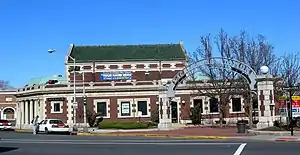 | |||||||||||
| General information | |||||||||||
| Location | Lackawanna Plaza, Montclair, Essex County, New Jersey 07042 | ||||||||||
| Coordinates | 40°48′41″N 74°12′48″W / 40.81139°N 74.21333°W | ||||||||||
| Platforms | 4 | ||||||||||
| Tracks | 6 | ||||||||||
| Other information | |||||||||||
| Station code | 604[1] | ||||||||||
| History | |||||||||||
| Opened | June 28, 1913[2] | ||||||||||
| Closed | March 2, 1981[3][4] | ||||||||||
| Electrified | September 3, 1930[5] | ||||||||||
| Former services | |||||||||||
| |||||||||||
Montclair Railroad Station | |||||||||||
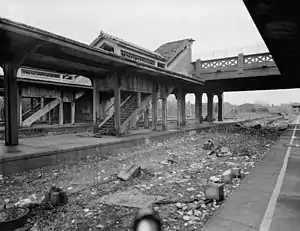 Abandoned platforms in 1983, with Grove Street Bridge in background. | |||||||||||
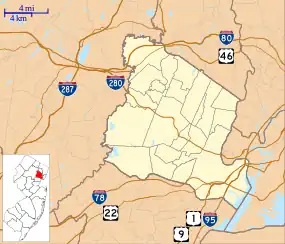 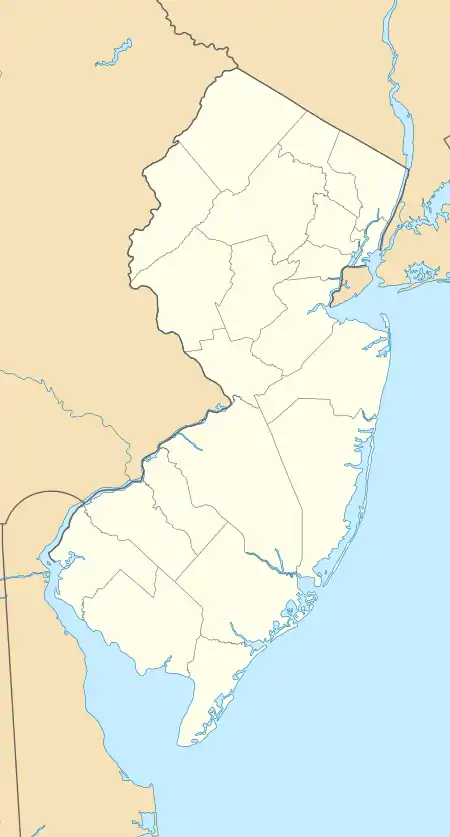  | |||||||||||
| Location | Lackawanna Plaza, Montclair, New Jersey | ||||||||||
| Area | 1 acre (0.40 ha) | ||||||||||
| Built | 1913 | ||||||||||
| Architect | William Hull Botsford | ||||||||||
| Architectural style | Grecian-Doric | ||||||||||
| NRHP reference No. | 73001092[6] | ||||||||||
| NJRHP No. | 1155[7] | ||||||||||
| Significant dates | |||||||||||
| Added to NRHP | January 8, 1973 | ||||||||||
| Designated NJRHP | August 7, 1972 | ||||||||||
Lackawanna Terminal is a former railroad terminal in the township of Montclair, Essex County, New Jersey. Built in 1913, the station was the terminal of the Montclair Branch of the Morris and Essex Lines (part of the Delaware Lackawanna and Western Railroad). The station, boasting four platforms and six tracks, was built by William Hull Botsford, an architect who died in the sinking of the Titanic on April 15, 1912. The station opened on June 28, 1913 in a grand ceremony in Montclair. The station was used until March 2, 1981, when New Jersey Transit moved service to a single platform station at Bay Street. The station was converted to an enclosed shopping mall.
Listed as the Montclair Railroad Station, it was added to the National Register of Historic Places on January 8, 1973, for its significance in architecture and transportation.[8] There were three main reasons that the station was considered to be qualified for the National Register. One was its architectural significance, including the overall design, the tapestry bond brickwork, the marble concrete trim, the interior brick and tile work and ornamentation, the iron work in the ticket windows. Next factor was the importance of the architect, William Hull Botsford and finally, its importance as a transportation center in the history of Montclair Township.[9]
As of 2019, the complex is threatened with demolition.[10]
Gallery
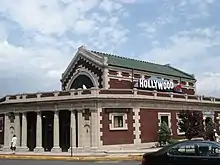 Renovated exterior of terminal in 2008.
Renovated exterior of terminal in 2008. Shopping mall interior in 2010.
Shopping mall interior in 2010.
See also
References
- ↑ "List of Station Numbers". Delaware, Lackawanna and Western Railroad. 1952. p. 2. Retrieved June 2, 2019.
- ↑ "Montclair Joyous in New Terminal". The New York Times. June 29, 1913. p. 11. Retrieved January 14, 2020 – via Newspapers.com.

- ↑ Grodt, Rod (February 26, 1981). "Bay St. Station Opens Monday". The Montclair Times. pp. 1, 12. Retrieved January 14, 2020 – via Newspapers.com.

- ↑ "Bay Street Railroad Station Opens". The Montclair Times. March 5, 1981. p. 1, 9. Retrieved January 14, 2020 – via Newspapers.com.

- ↑ "D.L.&W. Electric Train Hoboken to Montclair". The Madison Eagle. September 5, 1930. p. 6. Retrieved January 31, 2021 – via Newspapers.com.

- ↑ "National Register Information System – (#73001092)". National Register of Historic Places. National Park Service. March 13, 2009.
- ↑ "New Jersey and National Registers of Historic Places – Essex County" (PDF). New Jersey Department of Environmental Protection – Historic Preservation Office. September 29, 2022. p. 10.
- ↑ Historic Sites Section (July 1972). "National Register of Historic Places Inventory/Nomination: Montclair Railroad Station". National Park Service. With accompanying two photos
- ↑ Chance, Jack (1981).
{{cite journal}}: Cite journal requires|journal=(help); Missing or empty|title=(help) - ↑ "Lackawanna Train Station Makes Top 10 Most NJ Endangered Historic Sites," by Jamie Julia Winters (Montclair Local; May 16, 2019)
